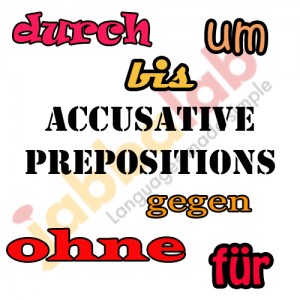German Prepositions
A preposition is a word such as for, without or to. Prepositions show the relationship of a noun or pronoun to some other words and are usually placed before the noun or pronoun.
For example:
This cake is for you.
I can’t do it without your help.
He moves to Germany.
You can now learn even more on this topic with the help of a fun video and a grammar quiz. Simply check out our Information and Directions Module in level A2.
Understanding the Meaning of Prepositions
German prepositions and their English counterpart aren’t always the same. The German preposition in for example is the same as the English preposition in but can be also used as into or to.
For example:
Markus ist in der Stadt. ⇨ Markus is in town.
Ich ging in die Post. ⇨ I went into the post office.
Er möchte nicht in die Kirche. ⇨ He doesn’t want to go to church.
Therefore it‘s important to get the idea out of your mind straight away that there is always a parallel meaning between German prepositions that resemble English prepositions because prepositions usually have more than one meaning.
| Tip |
|---|
|
Try to remember prepositions in commonly used phrases and get a feeling for the various meanings a preposition may have. |
Types of Prepositions
There are a few different types of prepositions which are categorised as follows:
- Local Prepositions: These prepositions give you more information where something is located.
- Temporal Prepositions: These prepositions give you more information about the time.
- Modal Prepositions: These prepositions give you more information about the way people do things.
- Causal Prepositions: These prepositions give you more information about the reasons for an action.
German prepositions in this group are: ab (from), an (at), auf (on), aus (from), bei (at), bis (until), durch (through), gegen (against), hinter (behind), in (in), nach (to), über (over), unter (under), von (from), vor (in front of), zu (to), zwischen (between)
German prepositions in this group are: ab (from), an (on), bis (until), gegen (around), in (in), nach (past), seit (since), um (at), von … bis (from … to), vor (to), zu (at), zwischen (between)
German prepositions in this group are: als (as), aus (made of), außer (except), entsprechend (according to), mit (with), nach (according to), ohne (without)
German prepositions in this group are: anhand (with the help of), aufgrund (based on), aus (out of), dank (thanks to) durch (through), für (for), infolge (due to), vor (because of), zuliebe (for the sake of)
Prepositions and the Cases
German prepositions break down into four groups. Some of them use the accusative and some use the dative or genitive case. On top of this, there are also some that can be either accusative or dative, depending on the context of the sentence. When using a preposition, the article of the noun may change depending on the gender and case.
Accusative Prepositions
There are six prepositions which are strictly linked to the accusative case. Let’s have a look at a table that shows you the prepositions in connection with the definite article der, die and das:
| Preposition | Masculine | Feminine | Neuter |
|---|---|---|---|
| bis (until, till) | bis den | bis die | bis das |
| durch (through, by) | durch den | durch die | durchs |
| für (for) | für den | für die | fürs |
| gegen (against, for) | gegen den | gegen die | gegen das |
| ohne (without) | ohne den | ohne die | ohne das |
| um (around, for, at) | um den | um die | ums |
As these prepositions are followed by the accusative case the masculine article der will change to den. After a few German accusative prepositions, a shortened form of the definite article can be merged with the preposition to make one word:
durch + das = durchs
für + das = fürs
um + das = ums
Example sentences:
Bis nächsten Sonntag! ⇨ Until next Sunday!
Wir laufen durch den Park. ⇨ We are walking through the park.
Vielen Dank für die Auskunft. ⇨ Thank you very much for the advice.
Ich stellte das Fahrrad gegen die Wand. ⇨ I put the bike against the wall.
Der Bahnhof ist gleich um die Ecke. ⇨ The train station is around the corner.
As you can see, some articles, pronouns and adjectives change their form in the accusative case. You can fresh your memory up by reading our blog How the German Cases work.

